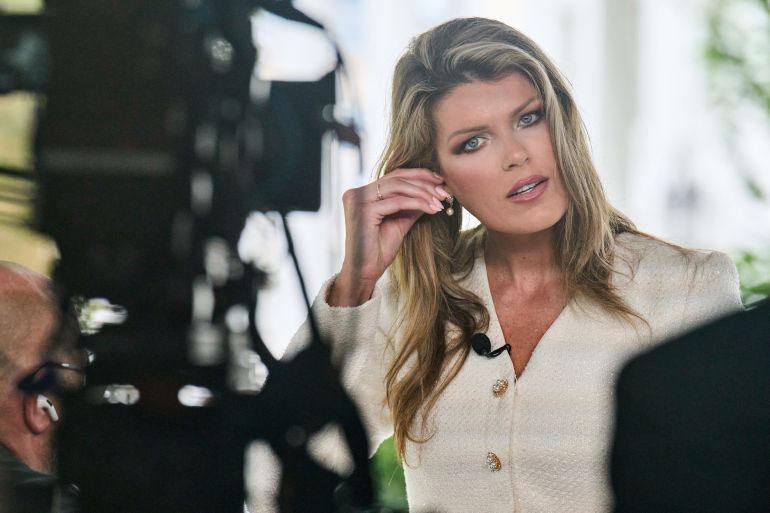US judge dismisses criminal charges against James Comey, Letitia James
The court found that lawyer Lindsey Halligan had been illegally appointed to her role as acting US attorney under President Donald Trump.

By News Agencies
Published On 24 Nov 202524 Nov 2025
Save
A United States federal judge has thrown out the criminal charges against New York Attorney General Letitia James and James Comey, the former head of the Federal Bureau of Investigation (FBI).
On Monday, District Judge Cameron McGowan Currie determined that the prosecutor overseeing the two cases, Lindsey Halligan, had been illegally appointed, which in turn rendered the indictments void.
Recommended Stories
list of 3 itemsend of list
The decision is a major setback for the administration of President Donald Trump, who personally petitioned for criminal charges against James and Comey.
But the legal odyssey for James and Comey, both prominent Trump critics, may not be over yet.
In dismissing the criminal charges, Currie rendered her verdict without prejudice, meaning that both cases could be refiled.
She did, however, rule that Halligan “had no legal authority” to bring the indictments, leaving questions about the future of her role as prosecutor.
Trump names Halligan as prosecutor
Halligan had been appointed in September to serve as interim US attorney for the Eastern District of Virginia.
Trump had a public falling-out with Halligan’s predecessor, Erik Siebert, who reportedly refused to file charges against James due to a lack of evidence.
That sparked outrage in the White House. Siebert announced his resignation on September 19, and the following day, Trump took to social media to declare that he had fired the prosecutor himself.
“He even lied to the media and said he quit, and that we had no case,” Trump wrote. “No, I fired him, and there is a GREAT CASE, and many lawyers, and legal pundits, say so.”
Advertisement
The president also addressed Attorney General Pam Bondi in the message, saying that the Department of Justice needed to move forward with charges against James, Comey and a US senator, Adam Schiff of California.
“What about Comey, Adam ‘Shifty’ Schiff, Leticia??? They’re all guilty as hell, but nothing is going to be done,” Trump wrote.
He urged Bondi to act immediately to secure indictments, signalling that Halligan would help.
“We can’t delay any longer, it’s killing our reputation and credibility,” Trump said. “JUSTICE MUST BE SERVED, NOW!!!”
Before her appointment, Halligan had no prosecutorial experience, and her background was largely in insurance law. Previously, she served as a personal lawyer to Trump.
Within days of taking up her role as US attorney, Halligan had secured an indictment against Comey for allegedly lying to Congress and obstructing a Senate proceeding.
Then, on October 6, Halligan unveiled a second indictment against James, accusing her of mortgage fraud.
A third indictment arrived on October 16, this time against Trump’s former national security adviser, John Bolton.
All three have denied wrongdoing and claimed the charges were acts of political retribution. Comey, James and Bolton have all criticised Trump publicly, and James even successfully pursued a civil fraud case against Trump in New York state.
Comey, James seek dismissal
Lawyers for the defendants have explored multiple channels to have the cases dismissed before trial.
On November 13, Judge Currie heard opening arguments in one petition brought by James and Comey.
They asserted that Halligan’s appointment as US attorney was invalid, since she did not have judicial approval.
Normally, interim US attorneys may only stay in the position for a span of 120 days. After that period, federal judges in the district may decide who fills the role.
Siebert had served for a 120-day period and had gotten judicial permission to continue as acting US attorney, until the Senate could confirm a permanent occupant for the role.
But Halligan did not have the judges’ approval. That made her appointment as US attorney illegal, according to lawyers for Comey and James.
Lawyers for the Justice Department, however, argued that the issue amounted to a mere “paperwork error” — and that Attorney General Bondi had likewise signed off on the indictments.
Still, the hearings in Currie’s courtroom raised serious questions about the validity of the indictments.
Currie raised concerns that the grand jury transcript in Comey’s case was incomplete, an issue later echoed by Magistrate Judge William Fitzpatrick in a separate ruling on November 17.
Advertisement
He said the records indicate “a disturbing pattern of profound investigative missteps”, including misleading statements from the prosecutor and the use of an unrelated search warrant. He also pointed out that it seemed the final indictment against Comey had never been fully presented to the grand jury, as required.
In another courtroom last week, overseen by Judge Michael Nachmanoff, the Justice Department acknowledged that it had indeed failed to give the grand jury a chance to review the final Comey indictment.
The Trump administration is likely to appeal Monday’s decision.
